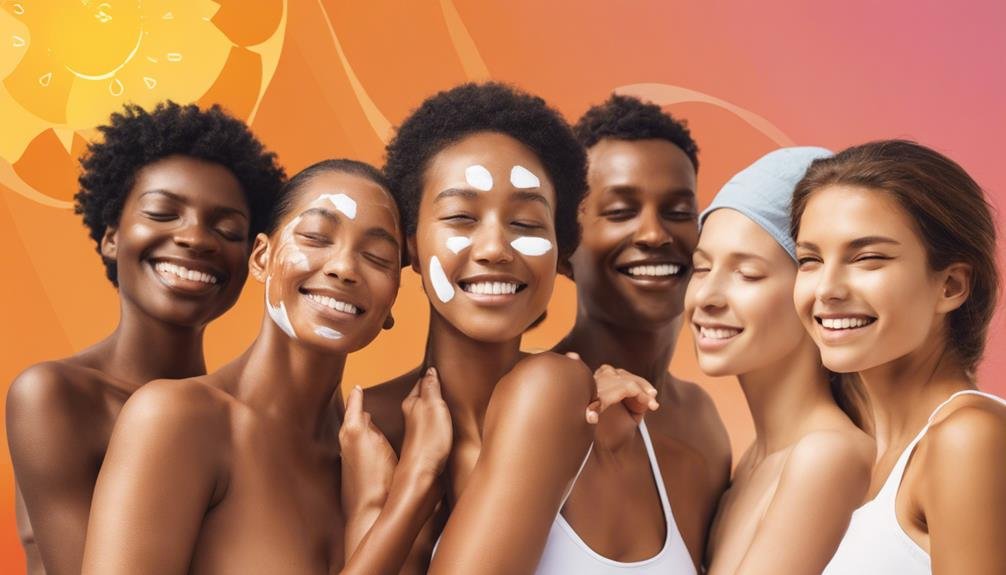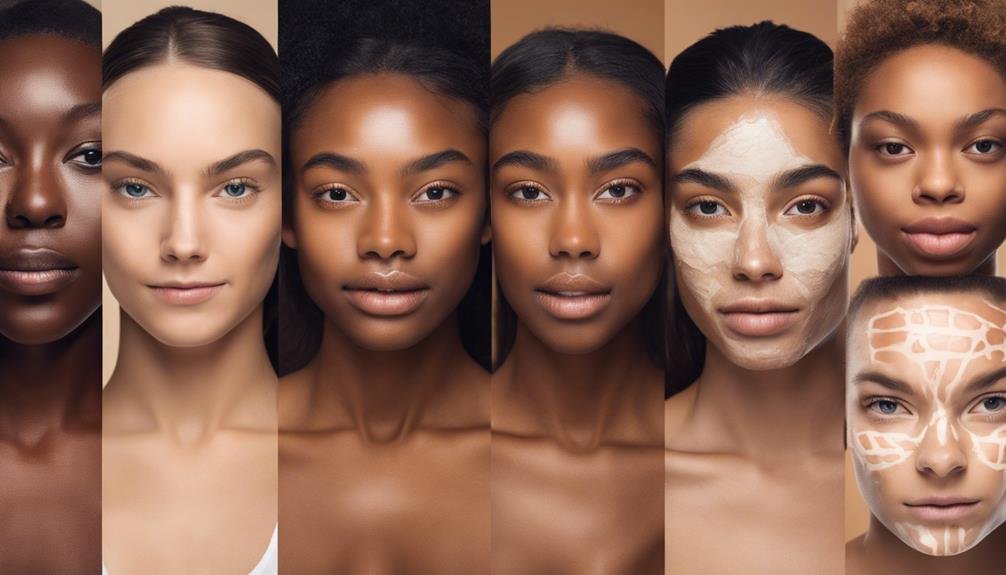When it comes to sun protection, did you know that all skin types require safeguarding from harmful UV rays? Ensuring your skin stays healthy and protected under the sun involves more than just applying sunscreen. By following a few simple tips, you can significantly reduce the risk of sun damage and maintain radiant skin. So, let's explore some key strategies to keep your skin safe and healthy in the sun.
Key Takeaways
- Apply SPF 30+ sunscreen daily.
- Reapply sunscreen every 2 hours.
- Wear protective clothing and hats.
- Seek shade between 10 a.m. and 4 p.m.
- Consult a dermatologist for personalized advice.
Importance of Sunscreen
Ensuring adequate sun protection is essential for maintaining healthy skin, and a crucial component of this is the regular use of sunscreen. Sunscreen forms a protective barrier on your skin, shielding it from harmful UV rays that can lead to premature aging, sunburn, and skin cancer. Even on cloudy days, UV rays can penetrate through the clouds, making it crucial to apply sunscreen daily.
When choosing a sunscreen, opt for a broad-spectrum formula that protects against both UVA and UVB rays. Look for a sun protection factor (SPF) of at least 30, which blocks 97% of UVB rays. Apply sunscreen generously and reapply every two hours, or more frequently if you're swimming or sweating.
Remember that sunscreen isn't just for beach days; it should be a part of your daily skincare routine. By incorporating sunscreen into your regimen, you aren't only protecting your skin from damage but also maintaining its health and youthful appearance for years to come.
Choosing the Right SPF
For effective sun protection, selecting the right SPF is key. When choosing a sunscreen, consider the following:
- Your Skin Type: Different skin types require different levels of protection. If you have fair skin that burns easily, opt for a higher SPF like 30 or above. If you have darker skin that rarely burns, an SPF of 15 may be sufficient.
- UV Exposure: If you spend a lot of time outdoors or live in a sunny climate, a higher SPF is advisable. Activities like swimming or sweating can also affect sunscreen efficacy, so choose water-resistant formulas for prolonged sun exposure.
- Daily Routine: Incorporating sunscreen into your daily routine is crucial for protecting your skin from the sun's harmful rays. Choose a broad-spectrum sunscreen that protects against both UVA and UVB rays and reapply every two hours for optimal protection.
Reapplying Sunscreen Regularly
Regularly reapplying sunscreen is crucial to maintain effective sun protection throughout the day. Even if a sunscreen claims to be long-lasting or water-resistant, it's essential to reapply it every two hours, or more frequently if you're swimming or sweating. Sunscreen can wear off due to factors like rubbing, sweating, or towel drying, making it less effective in shielding your skin from harmful UV rays.
To ensure continuous protection, remember to generously apply sunscreen to all exposed skin areas, including often-forgotten spots like ears, lips, and the tops of feet. Using about a shot glass amount for the entire body is a good rule of thumb. Set a timer or alarm on your phone to remind you when it's time to reapply, especially when you're having fun under the sun.
Wearing Protective Clothing
To enhance your sun protection regimen beyond sunscreen reapplication, wearing protective clothing is a smart choice. Clothing serves as an effective barrier against harmful UV rays, reducing your skin's exposure and risk of sun damage.
Here are three key tips for choosing and utilizing protective clothing:
- UPF Clothing: Opt for clothing with a UPF (Ultraviolet Protection Factor) rating to block out more UV radiation. Look for UPF-labeled clothing in a variety of styles for different outdoor activities.
- Dark, Tight-Knit Fabrics: Dark-colored clothing with tight weaves offers better protection than light-colored, loose fabrics. Consider long-sleeved shirts, long pants, and wide-brimmed hats for comprehensive coverage.
- Accessories Matter: Don't forget about accessories like sunglasses with UV protection and umbrellas for extra shade on sunny days. These additions complement your protective clothing and enhance your overall sun protection strategy.
Seeking Shade During Peak Hours
During peak hours of sunlight exposure, seeking shade is a proactive measure to reduce your skin's direct contact with harmful UV rays. The sun's rays are strongest between 10 a.m. and 4 p.m., making it crucial to limit your time in direct sunlight during these hours. Shade can come from trees, umbrellas, or buildings, providing a barrier between your skin and the intense sun. By seeking shade, you can lower your risk of sunburn, premature aging, and skin cancer.
When enjoying outdoor activities, remember to take breaks in shaded areas to give your skin a rest from the sun's intense rays. Even on cloudy days, UV rays can penetrate through the clouds, so seeking shade remains important for sun protection.
Additionally, seeking shade can help you stay cool and comfortable during hot summer days.
Make seeking shade a habit during peak hours to protect your skin and enjoy the outdoors safely.
Using Sun-Protective Accessories
Amidst your outdoor endeavors, equipping yourself with sun-protective accessories stands as a wise step towards safeguarding your skin from the sun's harmful UV rays. These accessories not only elevate your style but also provide essential protection against sun damage. Consider the following tips:
- Wide-Brimmed Hats: Opt for hats with broad brims to shield your face, neck, and ears from direct sunlight. This accessory adds a fashionable touch while offering practical sun protection.
- Sunglasses with UV Protection: Invest in sunglasses that block 100% of UVA and UVB rays to safeguard your eyes from harmful sun exposure. Look for labels indicating UV protection for optimal eye care.
- UV-Protective Clothing: Choose clothing items labeled with UPF (Ultraviolet Protection Factor) to shield your skin from UV radiation. These garments offer an extra layer of defense against the sun's harmful effects.
Understanding UV Index
With the sun's ultraviolet (UV) rays posing a potential risk to your skin health, understanding the UV Index becomes crucial in determining the level of sun exposure on a given day. The UV Index is a measure of the strength of the sun's UV radiation. It ranges from 1 (low) to 11+ (extremely high), with higher values indicating greater potential for harm. By checking the UV Index daily, you can plan your outdoor activities and sun protection measures accordingly.
UV Index values of 0-2 are considered low risk, while values of 3-5 are moderate, 6-7 high, 8-10 very high, and 11+ extreme. When the UV Index is high, it's important to seek shade, wear protective clothing, and apply sunscreen with a high SPF.
Remember that UV rays can still be harmful on cloudy days, so checking the UV Index is crucial even when it's not sunny. By understanding the UV Index and taking appropriate precautions, you can better protect your skin from sun damage and reduce the risk of skin cancer.
Avoiding Tanning Beds
Exposure to UV radiation from tanning beds poses a significant risk to your skin health. Tanning beds emit UVA and UVB rays that can penetrate deep into your skin, leading to premature aging, wrinkles, and an increased risk of skin cancer.
- Increased Risk of Skin Cancer: Using tanning beds exposes your skin to high levels of UV radiation, significantly increasing your chances of developing skin cancer.
- Premature Aging: The UV rays from tanning beds break down collagen and elastin in your skin, leading to premature aging, such as wrinkles, fine lines, and age spots.
- Skin Damage: Regular use of tanning beds can cause long-term damage to your skin cells, resulting in a dull complexion, uneven skin tone, and a higher susceptibility to sunburns.
To protect your skin health, it's crucial to avoid tanning beds altogether. Opt for safer alternatives like self-tanners or spray tans to achieve a sun-kissed glow without compromising your skin's well-being.
Hydrating Your Skin
Hydrating your skin is essential for maintaining its health and appearance. Proper hydration helps to keep your skin supple, smooth, and glowing. When your skin is dehydrated, it can become dry, flaky, and more prone to wrinkles and fine lines. To ensure your skin stays hydrated, it's important to drink an adequate amount of water daily.
The general recommendation is to drink at least eight glasses of water a day, but this can vary depending on individual factors like activity level and climate.
In addition to staying hydrated from the inside, using a moisturizer daily can also help lock in moisture and keep your skin hydrated. Look for a moisturizer that's suitable for your skin type and contains ingredients like hyaluronic acid, glycerin, or ceramides, which are known for their hydrating properties.
Eating Sun-Friendly Foods
To enhance your skin's natural defense against the sun's harmful rays, incorporating sun-friendly foods into your diet can be a beneficial strategy. Certain foods can provide your body with essential nutrients that support skin health and protection from UV damage. Consider adding the following to your diet:
- Antioxidant-rich Fruits: Berries, citrus fruits, and tropical fruits are packed with antioxidants like vitamin C and beta-carotene, which can help protect your skin from sun damage.
- Leafy Green Vegetables: Spinach, kale, and Swiss chard are excellent sources of lutein and zeaxanthin, antioxidants that can help safeguard your skin from UV radiation.
- Healthy Fats: Foods like nuts, seeds, and fatty fish contain omega-3 fatty acids, which have anti-inflammatory properties that can benefit your skin's resilience against sun exposure.
Checking Your Skin Regularly
Regularly monitoring your skin for any changes is a crucial aspect of maintaining its health and detecting potential issues early on. Conduct self-examinations monthly to familiarize yourself with your skin and notice any alterations. Look for new moles, changes in existing ones, or any unusual growths, sores, or discolorations.
Pay special attention to areas frequently exposed to the sun, such as your face, neck, arms, and hands. Remember the ABCDE rule for identifying suspicious moles: asymmetry, border irregularity, color variation, diameter larger than a pencil eraser, and evolving size, shape, or color.
Take note of any itching, tenderness, or bleeding in a spot. If you find anything concerning, consult a dermatologist promptly. Early detection of skin issues increases the likelihood of successful treatment.
Seeking Professional Advice
For individuals concerned about their skin's health and seeking guidance on maintaining optimal protection, seeking professional advice from a dermatologist is essential. Dermatologists are specialized medical professionals who can provide personalized recommendations based on your skin type, concerns, and specific needs.
Here are three important reasons why consulting a dermatologist for sun protection advice is crucial:
- Skin Cancer Risk Assessment: Dermatologists can assess your risk of developing skin cancer based on factors like family history, sun exposure habits, and skin type. This assessment helps in creating a tailored sun protection plan to reduce your risk.
- Customized Skincare Regimen: A dermatologist can recommend specific sunscreen formulations, skincare products, and protective clothing based on your skin's individual needs. This personalized approach ensures effective sun protection without compromising your skin's health.
- Early Detection of Skin Issues: Regular visits to a dermatologist allow for the early detection of any skin abnormalities, including precancerous lesions or early signs of skin cancer. Timely intervention can significantly improve treatment outcomes and overall skin health.
Frequently Asked Questions
Can I Use Expired Sunscreen?
Using expired sunscreen is not recommended. The effectiveness of the product diminishes over time, leaving you at risk of sunburn and skin damage. It's best to use sunscreen within its expiry date for optimal protection.
How Do I Remove Sunscreen Stains?
To remove sunscreen stains, mix dish soap with warm water and gently scrub the affected area. For tougher stains, create a paste with baking soda and water, apply, and let it sit before rinsing. Always check garment care labels for specific instructions.
Is It Safe to Wear Sunscreen While Swimming?
Swimming with sunscreen is safe and recommended. Reapply after swimming for continued protection. Water-resistant formulas are ideal. Enjoy your time in the water while keeping your skin safeguarded from harmful UV rays.
Can I Mix Different Types of Sunscreen?
Yes, you can mix different types of sunscreen for enhanced protection. Combining a broad-spectrum sunscreen with water-resistant properties and a higher SPF can offer better coverage. Layering products can provide added defense against UV rays, ensuring comprehensive sun protection.
What Is the Best Way to Soothe Sunburned Skin?
When dealing with sunburned skin, cool compresses, aloe vera gel, and moisturizers with ingredients like hyaluronic acid can help soothe and heal. Avoid further sun exposure and stay hydrated to aid in the recovery process.
Conclusion
So, remember to protect your skin by wearing sunscreen with SPF 30 or higher, reapplying every two hours, and seeking shade during peak sun exposure hours. Did you know that using sunscreen daily can reduce the risk of developing skin cancer by up to 40%? By following these sun protection tips, you can keep your skin healthy and safe from sun damage. Don't forget to check your skin regularly and consult with a professional for any concerns. Stay sun-safe!







